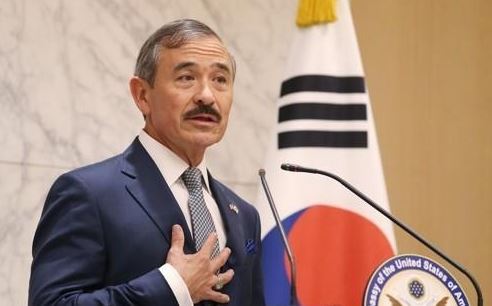US Ambassador to South Korea Harry Harris said Wednesday that America's alliance with South Korea is the "cornerstone for security and stability" throughout the region.
Harris made the remarks amid tensions between South Korea and the United States over Seoul's recent decision to terminate a military intelligence-sharing pact with Tokyo, which was seen as a symbolic platform to promote the US' trilateral security cooperation with its two Asian allies.
"The US-ROK Alliance continues to serve as the foundation for peace and prosperity on the Korean Peninsula and as the cornerstone for security and stability throughout the region," Harris said during a speech at the Indian Ocean Region Conference in the Maldives. ROK stands for South Korea's official name, Republic of Korea.
"Of course, North Korea continues to pose a persistent challenge with its UN-proscribed weapons programs, but we're in a far more optimistic place today than we were just over a year and a half ago when I wore a different uniform," he added.
 |
(Yonhap) |
Harris also noted a historic encounter among South Korean President Moon Jae-in, US President Donald Trump and North Korean leader Kim Jong-un at the inter-Korean border on June 30, saying the gathering showed the strength of the alliance.
"That moment clearly demonstrated the strength of the US-ROK Alliance and our unity in advancing mutual hopes for peace, prosperity and stability on the Korean Peninsula and, more broadly, in the Indo-Pacific region," he said.
Concerns have risen that cracks could reopen in the longstanding South Korea-US security alliance, with Washington having made a rare public rebuke of Seoul's decision to end the General Security of Military Information Agreement (GSOMIA) with Tokyo.
Seoul's move to end GSOMIA came in response to Tokyo's export restrictions seen as political retaliation for last year's South Korean Supreme Court rulings against Japanese firms over wartime forced labor. Despite his emphasis on the crucial role of the alliance, Harris put "disagreements rooted in history" among the "serious and challenging" issues in the region.
"Some of them might be intimidating -- how in the world are we going to address issues like rising sea levels for island nations like Maldives ... or state sponsors of terror who seek nuclear weapons and the means to deliver them inter-continentally," he said.
"Or disagreements rooted in history that threaten to tear asunder deeply important security frameworks essential to peace, prosperity and stability," he added.
Last Wednesday, South Korean Vice Foreign Minister Cho Sei-young held talks with the US ambassador and asked Washington to refrain from public messaging against Seoul's decision to end GSOMIA.
Since then, Harris has apparently canceled or delayed his plans to attend some public events, triggering speculation over lingering friction between Seoul and Washington. (Yonhap)






![[Herald Interview] 'Trump will use tariffs as first line of defense for American manufacturing'](http://res.heraldm.com/phpwas/restmb_idxmake.php?idx=644&simg=/content/image/2024/11/26/20241126050017_0.jpg)

![[Exclusive] Hyundai Mobis eyes closer ties with BYD](http://res.heraldm.com/phpwas/restmb_idxmake.php?idx=644&simg=/content/image/2024/11/25/20241125050044_0.jpg)